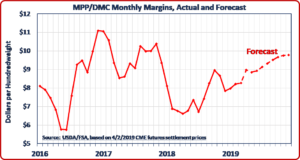ARLINGTON, Va. – The National Milk Producers Federation endorsed the Environmental Protection Agency’s proposed changes to the Waters of the U.S. rule, a proposal meant to provide clarity and certainty about the waterways subject to regulation under the federal Clean Water Act. Released in February 2019, the EPA proposal was a response to the ill-fated 2015 WOTUS rule that has been mired in litigation.
NMPF urged the EPA in 2014 to rethink WOTUS, citing its many ambiguities and uncertainties. A subsequent NMPF analysis showed that the EPA and Army Corps of Engineers’ proposal did not meet the requirements of various Supreme Court rulings that were the catalyst for the 2015 regulation.
NMPF expressed strong support for the basic jurisdictional line EPA made around intermittent and more significant waters as being within the regulatory power of the United States. NMPF believes this line accurately reflects the U.S. Constitution, statutes, and court decisions interpreting the law.
“Clean water is essential to milk production, and the dairy industry is very willing to work with EPA to protect U.S. waters,” said NMPF President and CEO Jim Mulhern. “EPA’s latest draft provides the clarity and certainty we were seeking in 2014 around which waterways fall under the jurisdiction of the Clean Water Act. While it has taken five years, we are grateful EPA has redrafted the WOTUS regulations.”
NMPF submitted 22 pages of comments on the EPA regulation for when farmers must seek Clean Water Act permits for a long list of normal farming activities near wetlands. While the WOTUS proposal did address many long-standing concerns, NMPF offered some additional points of clarity in other areas to further improve the proposal.
###
The National Milk Producers Federation (NMPF), based in Arlington, VA, develops and carries out policies that advance dairy producers and the cooperatives they own. NMPF’s member cooperatives produce the majority of U.S. milk, making NMPF the voice of dairy producers on Capitol Hill and with government agencies. For more, visit www.nmpf.org.


 g in MPP during 2018 due to this restriction to enroll retroactively in MPP and collect payments for 2018 for the months during which they were prevented from doing so. Farmers who purchased buy-up coverage under MPP during 2014-2017 are also eligible under the Farm Bill to receive a partial refund of their net payments during those years.
g in MPP during 2018 due to this restriction to enroll retroactively in MPP and collect payments for 2018 for the months during which they were prevented from doing so. Farmers who purchased buy-up coverage under MPP during 2014-2017 are also eligible under the Farm Bill to receive a partial refund of their net payments during those years.



